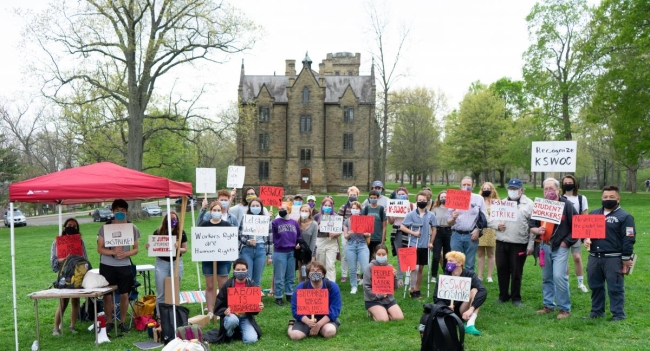You have /5 articles left.
Sign up for a free account or log in.

Student workers participated in a strike and picketing last week for recognition of their union, the Kenyon Student Worker Organizing Committee.
John Ortiz
Student workers at Kenyon College are escalating their yearlong battle to get the institution's administrators to voluntarily recognize their union.
At least 160 student workers are participating in an ongoing strike this week, in an attempt to pressure college officials to recognize the union should the results of an election demonstrate majority support for a union representing all undergraduates employed by the college.
The Kenyon Student Worker Organizing Committee, or K-SWOC/UE, began rallying support last April among undergraduate workers at the private liberal arts college in Ohio. The students publicly announced the formation of the union last August. It is affiliated with United Electrical, Radio and Machine Workers of America Local 712, which already represents maintenance workers on campus.
Sally Smith, a sophomore and K-SWOC/UE spokesperson, said the union has already proven it has widespread support on campus by collecting signature cards from 60 percent of the 468 student employees saying they want union representation.
If recognized by Kenyon, the students would break new ground in higher education labor organizing history as the first union in the country to represent all undergraduate workers on a campus. Kenyon administrators have so far refused to recognize K-SWOC/UE and last week accused striking students of disrupting administrative meetings, damaging a college building and "threatening and intimidating" staff members during an April 29 picket in and outside multiple campus buildings.
The strikers deny damaging any property. They say it was campus safety officers who were being intimidating by demanding to see students' identification and threatening to call local law enforcement on students who refused to show ID. Smith described the rally as "tame" and said it was "hurtful" of college officials to characterize the student workers as threatening.
K-SWOC/UE filed an Unfair Labor Practice complaint with an Ohio regional office of the National Labor Relations Board, arguing that the response of the campus safety officers was retaliation against federally protected union activities.
Djibril Branche, a sophomore and outgoing president of the Black Student Union who was at the rally, said the safety officers told students they were violating Kenyon’s protests and demonstrations policies.
"They asked for IDs and said if IDs weren’t given to them, they would call the cops," said Branche, who works on the college's farm planting and growing crops. "This is definitely the most aggressive campus safety ever was."
Janet Marsden, a spokesperson for the college, disputed these accounts and said campus safety officers did not threaten students or call police.
The officers "followed standard protocol in investigating striker conduct inside a campus building where a college admissions meeting was in progress," Marsden wrote in an email. "They followed protocol in asking the handful of individuals engaged in the misconduct to provide identification to establish their status as Kenyon students, just as they do in other instances of misconduct on campus."
An April 29 news release from the college said the "claims that campus safety officers threatened students with arrest are simply false."
Now that K-SWOC/UE has filed a complaint with the NLRB, the outcome will depend on how the college applied its protest policy, if the policy is in violation of the federal law and whether the strikers were treated differently than students at other protest rallies, said William Herbert, executive director of the National Center for the Study of Collective Bargaining in Higher Education and Professions at Hunter College in New York City.
"They cannot apply this policy in a way that is discriminatory for union activities as opposed to other activity," Herbert said. But "if they show there was conduct in the college buildings that resulted in damage to campus property or engaging in disruption of certain activities, it could be a basis for them to defend against the labor practice charge."
Marsden said the college cannot comment on the specifics of the NLRB proceedings but added that "Kenyon has respected, and will continue to respect, students’ rights to engage in peaceful protests, and Kenyon has neither threatened nor retaliated against any students in connection with those protests."
Smith said union leaders believe administrators' reactions to the picketing -- "Pushing back on us in a public manner that they haven't before" -- gave the union more momentum.
Sigal Felber, a senior who works at a library on campus fielding research assistance inquiries made online and is on the union’s steering committee, said the organizing effort was initially sparked by the coronavirus pandemic, which highlighted sharp socioeconomic differences between students at Kenyon, which costs an average of $76,620 in annual tuition, room and board, and other fees.
Felber said student workers at the college tend to be international students, students of color and low-income and first-generation students who participate in federal work-study programs or work jobs on campus to cover basic needs. They also often put up with mistreatment in their jobs in order to stay afloat, she said.
“The school is pretty socioeconomically segregated,” said Felber, whose job is part of the work-study program. “There’s cognitive dissonance where people don't really understand what it means to be a worker on campus. It's kind of diminishing.”
Herbert said student workers nationally gained more organizing power due to a 2016 National Labor Relations Board ruling that said student employees at private institutions can engage in collective bargaining under the National Labor Relations Act. But the board is now comprised of a majority of Trump administration appointees, who student organizers fear will be unfriendly to their efforts to unionize, he said. This is one reason student workers have rallied to push Kenyon to voluntarily recognize them, rather than directly petitioning the NLRB for recognition.
Membership in student worker unions by undergraduates is still relatively rare. Only one-quarter of newly certified graduate student employee collective bargaining units created between 2013 and 2019 included undergraduate workers, according to an analysis by the Hunter College center and co-authored by Herbert. K-SWOC/UE, which is requesting union representation for all student workers on campus, is also a rarity among recent undergraduate unionizing efforts, which have focused on representation for select student employee groups on campus, such as resident assistants, he said.
“Some institutions are still going to argue that particular students are not employees for purposes of collective bargaining,” he said. “It’s an individual decision. It probably has to do with who’s leading the institution, who’s on the Board of Trustees and what their values are and how strongly they feel about the question of unionization.”
Marsden, the Kenyon spokesperson, said the strike at Kenyon has not changed the minds of college administrators and members of the Board of Trustees.
“The Board and administration do not believe that recognizing a union of student workers is in the best interests of the College and its broader community,” Marsden wrote in an email. “It is not appropriate to cede these educational responsibilities to a process that involves bargaining with a third party that represents only a small part of the interests at stake for only a segment of all Kenyon students.”
Kenyon president Sean Decatur issued a lengthy statement in December explaining why the administration would not voluntarily recognize an undergraduate union. The college’s primary role in the lives of students is education, not employment, and the union cannot adequately represent a majority of student workers, all of whom have different financial needs and roles on campus that would be difficult to include under a big tent, Decatur said.
“While unions can serve important roles in some workplaces in some industries, that model does not fit our undergraduate academic setting, where the education of students is paramount,” he said. “Students’ motivations for working on campus are likewise diverse, highly personal, and based on their individual needs. We do not believe these needs are appropriately addressed on a one-size-fits-all basis through collective bargaining with a union.”
Ed Schortman, an anthropology professor who has worked at Kenyon for 40 years, said the president and board’s response has been paternalistic and dismissive of student workers’ rights and needs. He said the college is telling students to blindly trust administrators rather than meeting with students to discuss how to improve working conditions.
Schortman wrote two letters to Decatur, signed by other faculty members, in support of K-SWOC/UE. The most recent letter was signed by 35 faculty members and backed the students' right to strike and hold a community election for union recognition.
Engaging with the union is “the only way I could see a college or university living up to the democratic principles we purport to teach,” Schortman said. “All the power is in the hands of the administrators, and there’s an increasing sense that you can’t count on them to bring you into conversations that matter … Kenyon may be run by very nice people, but at the end of the day, the administrators don't know what student workers face and don’t know the realities of their existence, so can’t act in a way that’s consistent with those realities.”
Marsden said having an undergraduate workers' union on campus would derail other democratic and shared governance processes for students, such as processes used by student government bodies. These groups already offer students an opportunity to raise campuswide issues through elected students, she said in the email.
“We are concerned that having a union for a segment of students could limit the open expression of voices in that long-standing system of shared governance, which could undermine the democratic process for the community as a whole,” Marsden wrote. “Recognizing a union would effectively tie future generations of undergraduate students to union representation, based on the views of a segment of students here today … That outcome disenfranchises future students and, in our view, is neither democratic nor fair.”
Marsden said student workers who feel they are being mistreated can report it to their supervisors. However, John Ortiz, a junior international student from Costa Rica and a resident hall assistant, said his supervisors have not taken his concerns seriously.
Ortiz said he is responsible for 120 students and has had to handle student crises and incidents he believes are beyond his level of experience and pay grade. He said his attempts to get his supervisors to address the problems have been unsuccessful and a union would provide him and other resident assistants with a formal process for filing a grievance and getting recourse.
“My job is a constant stress on me, but at the end of the day, it’s a stress I have to deal with because I require this job for the pay,” Ortiz said. “I am a very low-income student, and there's nothing else I can do.”
Marsden said she does not have knowledge of the incidents detailed by Ortiz and cannot comment on them.




